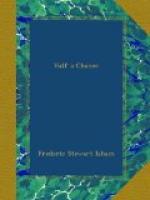Thereafter he remained outwardly quiescent; resistance on his part, and the consequences that would ensue, might not be displeasing to his chief enemy; it would settle the case in short and summary fashion. Justification for extreme proceedings would be easily forthcoming and there would be none to answer for John Steele.
Where were they going? John Steele could not surmise; he saw, however that they had left behind the neighborhood of hovels, narrow passages and byways, and traversed now one of the principal circuses. There the street traffic moved smoothly; they seemed but an unimportant part of an endless procession which they soon left to turn into a less public, more aristocratic highway. A short distance down this street, the carriages suddenly stopped before an eminently respectable and sedate front, and, not long after, John Steele, somewhat to his surprise, found himself in Lord Ronsdale’s rooms and that person’s presence.
The nobleman had been forewarned of John Steele’s coming. He sat behind a high desk, his figure and part of his face screened by its massive back. One drawer of the desk was slightly opened. What could be seen of his features appeared sharper than usual, as if the inner virulence, the dark hidden passions smoldering in his breast had at length stamped their impression on the outer man. When he first spoke his tones were more irascible, less icily imperturbable, than they had been hitherto. They seemed to tell of a secret tension he had long been laboring under; but the steady cold eyes looked out from behind the wood barrier with vicious assurance.
The police agent he addressed first; his services could be dispensed with for the present; he should, however, remain in the hall with his men. Mr. Gillett looked from the speaker to him he had brought there and after a moment turned and obeyed; but the instant’s hesitation seemed to say that he began to realize there was more to the affair than he had fathomed.
“There is no need for many words between us, Mr. Steele.” Lord Ronsdale’s accents were poignant and sharp. “Had you listened to what Mr. Gillett, on my behalf, would have said to you that night in the gardens at Strathorn House, we might, possibly, both of us, have been saved some little annoyance. We now start at about where we were before that little contretemps.”
John Steele silently looked at Lord Ronsdale; his brain had again become clear; his thoughts, lucid. The ride through the cool and damp air, this outre encounter at the end of the journey, had acted as a tonic on jaded sense and faculty. He saw distinctly, heard very plainly; his ideas began to marshal themselves logically. He could have laughed at Lord Ronsdale, but the situation was too serious; the weakness of his defenses too obvious. Proofs, proofs, proofs, were what the English jury demanded, and where were his? He could build up a story; yes, but—if he could have known what had taken place between Mr. Gillett and this man a few minutes before, when the police agent had stepped in first and tarried here a brief period before ushering him in!




